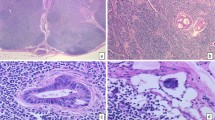Abstract
Lymph node staging is a major prognostic factor in colorectal cancer and remains to be the most important criterion for selecting patients for adjuvant therapy. The standard approach for lymph node evaluation is based on manual dissection and histological evaluation of HE-stained slides. For stage III disease (node positive), adjuvant chemotherapy increases the survival rate, while in node-negative stage II disease, in most cases, the chemotherapy is contraindicated due to increased morbidity without real benefit. Up to 30% of patients with node-negative colon cancer staged by standard pathologic techniques ultimately suffer disease recurrence and tumour-related mortality following potentially curative primary resection. Variations in outcome among patients with node-negative early-stage disease may reflect inadequate nodal resection and inaccuracies of pathologic staging. Hence, an accurate pN stage becomes essential. It is seen that classic pathological exam sometimes fails to identify lymph node micrometastases or isolated tumour cells, which might explain local or distant relapses in stage II patients. Sentinel lymph node study has the potential to detect micrometastases and lead to upstaging the disease which is crucial for planning adjuvant therapy and follow-up in these patients. In our study, we carried out SLNB in 40 clinically stage II patients operated for colon cancer. We used peritumoural injection of dye at the time of surgery to detect SLN(s) and analysed them using both microsectioning and immunohistochemical (IHC) staining. Our results show that SLNB can improve the accuracy of pTNM staging.










Similar content being viewed by others
References
Bembenek AE, Rosenberg R, Wagler E, Gretschel S, Sendler A, Siewert JR, Nährig J, Witzigmann H, Hauss J, Knorr C, Dimmler A, Gröne J, Buhr HJ, Haier J, Herbst H, Tepel J, Siphos B, Kleespies A, Koenigsrainer A, Stoecklein NH, Horstmann O, Grützmann R, Imdahl A, Svoboda D, Wittekind C, Schneider W, Wernecke KD, Schlag PM (2007) Sentinel lymph node biopsy in colon cancer: a prospective multicenter trial. Ann Surg 245:858–863
Joosten JJ, Strobbe LJ, Wauters CA, Pruszczynski M, Wobbes T, Ruers TJ (1999) Intraoperative lymphatic mapping and the sentinel node concept in colorectal carcinoma. Br J Surg 86(4):482–486
Yang Y, Wang G, He J, Zhang J, Xi J, Wang F (2018) High tie versus low tie of the inferior mesenteric artery in colorectal cancer: a meta-analysis. Int J Surg 52:20–24
Paramo JC, Summerall J, Poppiti R, Mesko TW (2002) Validation of sentinel lymph node mapping in patients with colon cancer. Ann Surg Oncol 9:550–554
Bertagnolli M, Miedema B, Redston M, Dowell J, Niedzwiecki D, Fleshman J, Bem J, Mayer R, Zinner M, Compton C (2004) Sentinel node staging of resectable colon cancer: results of a multicenter study. Ann Surg 240(4):624–628 discussion 628–630
Saha S, Seghal R, Patel M, Doan K, Dan A, Bilchik A, Beutler T, Wiese D, Bassily N, Yee C (2006) A multicenter trial of sentinel lymph node mapping in colorectal cancer: prognostic implications for nodal staging and recurrence. Am J Surg 191:305–310
Hennedige T, Teo L, Ang B, Cheong WK, Venkatesh SK (2010) Accuracy of preoperative CT for local staging of colorectal carcinomas. Singap Med J 51(6):475–480
Bertoglio S, Sandrucci S, Percivale P, Goss M, Gipponi M, Moresco L, Mussa B, Mussa A (2004) Prognostic value of sentinel lymph node biopsy in the pathologic staging of colorectal cancer patients. J Surg Oncol 85(3):166–170
Nicastri DG, Doucette JT, Godfrey TE, Hughes SJ (2007) Is occult lymph node disease in colorectal cancer patients clinically significant? A review of the relevant literature. J Mol Diagn 9:563–571
Oh SY, Kim do Y, Kim YB, Suh KW (2014) Clinical application of sentinel lymph node mapping in colon cancer: in vivo vs. ex vivo techniques. Ann Surg Treat Res 87(3):118–122
Cabanas RM (1977) An approach for the treatment of penile carcinoma. Cancer 9:456–466
Bilchik AJ, Hoon DS, Saha S, Turner RR, Wiese D, DiNome M, Koyanagi K, McCarter M, Shen P, Iddings D et al (2007) Prognostic impact of micrometastases in colon cancer: interim results of a prospective multicenter trial. Ann Surg 246:568–575 discussion 575-577
Natsugoe S, Mueller J, Stein HJ, Feith M, Hofler H, Siewert JR (1998) Micrometastasis and tumor cell microinvolvement of lymph nodes from esophageal squamous cell carcinoma: frequency,associated tumor characteristics, and impact on prognosis. Cancer 83:858–866
Adell G, Boeryd B, Franlund B, Sjodahl R, Hakansson L (1996) Occurrence and prognostic importance of micrometastases in regional lymph nodes in Dukes’ B colorectal carcinoma: an immunohistochemical study. Eur J Surg 162:637–642
Gusterson BA, Ott R (1990) Occult axillary lymph-node micrometastases in breast cancer. Lancet 336:434–435
Croner RS, Geppert CI, Bader FG, Nitsche U, Späth C, Rosenberg R, Zettl A, Matias-Guiu X, Tarragona J, Güller U, Stürzl M, Zuber M (2014) Molecular staging of lymph node-negative colon carcinomas by one-step nucleic acid amplification (OSNA) results in upstaging of a quarter of patients in a prospective, European, multicentre study. Br J Cancer 110(10):2544–2550
Nordgård O, Oltedal S, Kørner H, Aasprong OG, Tjensvoll K, Gilje B, Heikkilä R (2009) Quantitative RT-PCR detection of tumor cells in sentinel lymph nodes isolated from colon cancer patients with an ex vivo approach. Ann Surg 249(4):602–607
Des Guetz G, Uzzan B, Nicolas P, Cucherat M, de Mestier P, Morere JF, Breau JL, Perret G (2007) Is sentinel lymph node mapping in colorectal cancer a future prognostic factor? A meta-analysis. World J Surg 31:1304–1312
Author information
Authors and Affiliations
Corresponding author
Ethics declarations
This study was cleared by the Ethics Committee, and patient consent obtained in all cases.
Additional information
Publisher’s Note
Springer Nature remains neutral with regard to jurisdictional claims in published maps and institutional affiliations.
Rights and permissions
About this article
Cite this article
Saidha, N.K., Mehta, R., Malhotra, M. et al. Sentinel Lymph Node Biopsy in Colon Cancer: an Institutional Experience. Indian J Surg Oncol 10, 632–639 (2019). https://doi.org/10.1007/s13193-019-00957-y
Received:
Accepted:
Published:
Issue Date:
DOI: https://doi.org/10.1007/s13193-019-00957-y




